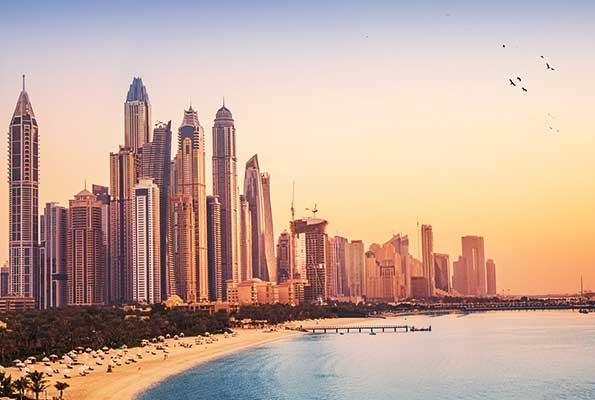The UAE’s non-oil sector continued to perform strongly in August 2023 on the back of a big increase in new orders, higher investments, and tourism growth, boosting confidence in the private sector to the highest level since the outbreak of the COVID-19 pandemic in early 2020.
The seasonally adjusted monthly S&P Global UAE Purchasing Managers’ Index (PMI), released in September 2023, saw it reaching 55.0 in August, down from 56.0 in July, thus signalling a significant improvement in the overall operating conditions.
The PMI is a weighted average of five indices, namely new orders, output, employment, suppliers’ delivery times, and stocks of purchases. A reading above 50 indicates an overall expansion in economic activity.
“Strong demand conditions across the non-oil economy gave firms greater confidence about the path for future activity. The Future Output Index signalled that business sentiment was at its highest level since March 2020, having improved in seven of the eight months in 2023 to date,” said David Owen, senior economist at S&P Global Market Intelligence, while interacting with the Khaleej Times.
“The findings suggest that the outlook for the non-oil sector is highly positive, with surveyed firms signalling that this was supported by rising new order inflows, greater tourism, and increased investment,” the official stated further.
After handling the COVID pandemic and the trade disruptions related to it, UAE has emerged as one of the best-performing economies in the last couple of years. The country’s economy grew at a remarkably fast pace in 2022 at around 7.9%, driven by the growth of all the key sectors. This trend continued into 2023, although at a bit lower pace as the economy cooled after tremendous growth in 2021-22.
In a recent interview with Bloomberg TV, Abdulla Bin Touq Al Marri, the Minister of Economy, was confident of achieving 7% GDP growth in 2023 as well on the back of reforms and Comprehensive Economic Partnership Agreements (CEPAs) signed with multiple major trading partners.
“However, the PMI survey showed a greater degree of confidence that strong economic activity will be sustained over the next 12 months. Importantly, private firms in the country suggested a marked shortening of supplier lead times in August, as vendors often responded positively to requests for faster deliveries. The improvement was the strongest recorded since July 2019,” The Khaleej Times report commented.
Employment levels also expanded during the latest survey period, albeit only to a modest degree.
“Most PMI indicators continued to give positive signals, including uplifts in input purchases, inventory building, job creation and improving supply chain conditions,” David Owen further.
Michael Bolliger, Chief Investment Officer, Emerging Markets at UBS Global Wealth Management, recently predicted the UAE’s GDP to stand at 3.5% in 2023, rising to 3.9% in 2024.
In a statement to the Emirates News Agency (WAM), Bolliger shared the bank’s positive outlook on the UAE’s medium-term growth prospects, supported by strong demand for its oil exports and energy investments, while expecting a strong 4.5% expansion for the non-energy part of the economy for 2023.
The introduction of a 9% corporate tax in 2023, following the adoption of 5% value-added tax (VAT) in 2018, has contributed towards bolstering public finances, Bolliger stated, while adding that these measures, along with the established initiatives to further reduce the economy’s dependence on the hydrocarbon sector, will further diversify the UAE economy.
“This, in turn, contributes to supporting macroeconomic stability as well as the country’s fiscal accounts and its balance of payment, further boosting the country’s attractiveness as a destination for foreign direct and portfolio investments,” he stated further.
Meanwhile, UAE is seeking to increase trade and investment ties with the Association of South East Asian Nations member states, as it has signed Comprehensive Economic Partnership Agreements with many of the countries in the bloc, Dr Thani Al Zeyoud, Minister of State for Foreign Trade, told the media.
The minister’s remarks were made during a visit to Jakarta, Indonesia, to attend the annual ASEAN Business and Investment Summit.
“As the economic centre of gravity continues to shift eastward, the UAE and ASEAN can form a powerful new corridor of opportunity, one that can direct capital into high-growth sectors, develop solutions in food security and energy transition, and create clusters of excellence in the industries of the future,” Dr Al Zeyoudi stated, while adding, “Our Cepa programme, which includes completed deals with Indonesia and Cambodia, and the launch of negotiations with Thailand, Vietnam and Malaysia, underlines our confidence in these economies – and their role in delivering a new Asian future.”



